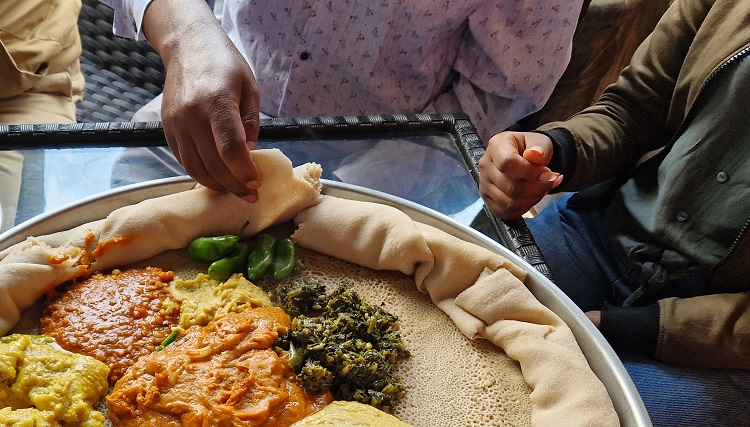
By Lucy Morris
There are many important conversations about decolonising knowledge taking place at the moment.
As international development practitioners, it can still be easy to assume that you’re open minded and unphased by difference. But arriving in Ethiopia in September 2023, I was surprised to see a sign saying: “Happy Ethiopian New Year: 2016”. Yellow flowers representing adey abeba (Bidens macroptera) – a unique species that only grows for Ethiopian New Year – adorned shops and public areas. My hotel information pack informed me about the Ethiopian year, which has 13 months and is 7 or 8 years behind the Gregorian calendar. “The 12 hour clock cycle in Ethiopia is offset by 6 hours”, the pack told me. “Please bear this mind mind when making local appointments.” It was definitely humbling to experience a different view of things for a while, and one of the many reasons why travel can be so powerful.
CSIF, insecurity, and civil society
The purpose of my visit was to provide technical support for the Civil Society Innovation Fund (CSIF). This is a three-year programme designed to support the creation of democratic, pluralistic, and innovative civil society in Ethiopia. Funded by the French Development Agency (Agence Française de Développement – AFD), the programme aims to support new and emerging Civil Society Organisations (CSOs) in Ethiopia, to play a stronger role in building peace and democracy.
This work feels all the more urgent, given a recent report published during our visit by the International Commission of Human Rights Experts on Ethiopia which made for sobering reading. Amongst other things, the report stated that “violent confrontations are now at a near-national scale, with alarming reports of violations against civilians in the Amhara region and on-going atrocities in Tigray”. I witnessed how internally displaced people were seeking safety in Addis Ababa. I also learnt how the conflict that broke out in Sudan in April 2023 had pushed over 250,000 people to neighbouring countries, including Ethiopia. Civil society is both stretched, and needed now more than ever.
INTRAC’s partnership with AGAR
Technical support for CSIF (in the form of programme management, coordination, and capacity development for Fund partners) is being provided by INTRAC in partnership with AGAR Development Partners Consulting. I’ve been working remotely with AGAR off-and-on in different capacities since starting work with INTRAC in 2020, but we hadn’t had the chance to physically meet until now due to COVID-19 travel restrictions. So it was a real pleasure to meet colleagues face-to-face for the first time, and to share some delicious meals of injera together.

Review of organisational development support
During the week, I helped to facilitate a review of the organisational development support which AGAR and INTRAC have been providing to three consortia of 15 new and emerging civil society organisations specifically focusing on media, gender and human rights. This has included a mixture of facilitated organisational capacity assessments, peer learning, three tailored trainings (in financial and grant management, in effective, innovative and evidence-based advocacy, and in rights-based and gender transformative project cycle management and MEL) and follow up mentoring and coaching support. It was great to hear examples of how these organisations were using their new skills to help develop other CSOs in turn. One example was their efforts to help to register youth groups which had been working in their communities for eight years, but which weren’t recognized by government – so that they could access government funds and financial support from other donors.
We also held initial conversations about the design of a new leadership development programme for CSO staff, facilitated by Ethiopian leadership development specialists.
Reflections from the biannual strategy meeting
INTRAC and Agar also provided support for a biannual strategy meeting, where we heard back from each consortium lead on the three projects.
I was particularly struck by a presentation about an initiative to support emerging Civil Society Leadership, run by the Civil Society Resource Centre. It involves recruiting 20 emerging leaders from universities and providing training on a range of topics (including an introduction to CSO operations, project design and strategic analysis). Memoranda of Understanding are then signed with Ethiopian CSOs, so that the students can secure practical work experience while they’re studying. One of the students shared her experiences of the programme, saying: “we’re the next generation of CSO leaders, and it was good to understand what the work is like in practice. It’s not all ‘glam and gold’! We are interested in building up our own CSOs, but while interest is one thing, it’s not enough.”
While civil society capacity development work certainly isn’t all ‘glam and gold’, it was very inspiring to hear the personal commitment that so many of the CSIF programme partners had to their work. This had come at a high personal cost to some, who had been imprisoned for their views under the previous regime, but who had been successfully defended by other members of CSIF consortium who were trained lawyers. It was a reminder of the importance of this work, and how ‘courage calls to courage everywhere’.